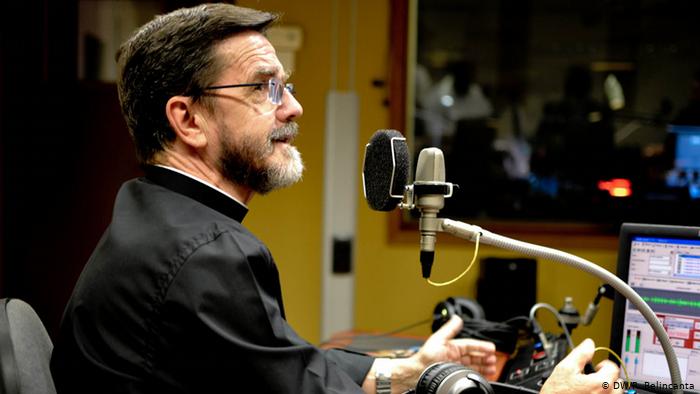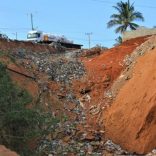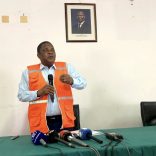Mozambique: UN warns of challenges in combating human trafficking in north
Attacks in Cabo Delgado: “The situation continues and is deepening.”

- The Bishop of Pemba confirms that insurgents attacked villages in Muidumbe last week. Dom Luiz Fernando says there were beheadings, but that it is not possible to specify the number of victims.
In the last few days, there has been worrying news about the situation in Cabo Delgado, Mozambique. First, the government confirmed attempted assaults on prison establishments by insurgents and, this Monday (09-11), the National Community Radio Forum (FORCOM) reported that several radio journalists are currently in hiding in the bush after another attack in Muidumbe district.
Asked by DW about the latest events, the Bishop of Pemba, Dom Luiz Fernando Lisboa, says that the situation is “deepening”, with the insurgents carrying out multiple attacks.
Last week, he says, eleven more villages were attacked in Muidumbe district. The insurgents “spread a lot of death, burning public buildings and houses”, he says.
“In one of the villages, they killed several young people undergoing the initiation rite. There were about 15 young people aged between 12 and 15 years old. We have heard this from several sources,” Dom Fernando Lisboa confirms, while warning that, given the complexity of the situation, there are no precise figures.
On the same occasion, the bishop said that “Pemba is overcrowded”.
DW Africa: Are you aware of the events described?
Dom Luiz Fernando Lisboa (LFL): The journalists in hiding are from Radio São Francisco in Nangololo mission, in the village of Muambula, one of those attacked.
The journalists are from that village, so they fled with their families, as [did] the entire population. They did not flee from persecution of journalists; they fled because the village was being attacked.
DW Africa: Is the news from there showing a worsening of the situation, or is it that more reports are coming in?
LFL: The situation continues and is deepening, because after the capture of Mocímboa da Praia, there was a fierce attack on Quissanga – so much so that practically the entire population of Quissanga left. And now, last week, they attacked eleven more villages in Muidumbe, another district. And they spread a lot of death, burned public buildings and houses, and beheaded people.
DW Africa: This Tuesday, several international agencies and media reported that terrorists had beheaded about 50 people in the village of Muatide. Can you confirm this?
LFL: I can’t confirm the number, because there are no people in these villages – the people either died or fled. So it’s hard to say whether it was 40 or 50 people. I just spoke to a young man from that village [Muatide] whose uncle and brother were killed, but he doesn’t know how many people died. The news is not accurate, but [we know] there were attacks and deaths in eleven villages. In one of the villages, about 15 young people from 12 to 15 years old undergoing initiation were killed. We have heard several sources confirm this. [What is being said in the media], that it was 40 or 50, we do not know how to quantify. Anyone who says they have accurate information at this point is taking a risk. For example, the boat that sank, they said many numbers – 50, 40, 30. The latest information we have is that it was about 40 people [who died].
DW. This conflict is difficult to cover. There are no journalists on the ground, and news of what is happening is very much dependent on the Mozambican government, even on the insurgents. In your opinion, has this impaired the perception of the conflict abroad and the support for victims?
LFL: It has harmed it a lot, because we have people who have fled, and the only thing they are crying about is that they left their grandparents behind. The old people have no way to flee, to walk through the bush for four, five or six days. So, a lot of people were left behind – one more pain to endure. People suffer because they lost [their possessions], because they were forced to flee, they suffer because they have had family members killed, and because they left family members behind.
.DW Africa: Are many displaced people still arriving in Pemba? What is the current situation in the camps?
LFL: Pemba is overcrowded. People continue to arrive at the beach. Unfortunately, we do not have the necessary conditions to welcome and relocate these people. So there are still people sleeping on the beach and being assisted there.
DW Africa: What kind of initiatives are you continuing to carry out?
LFL: As a church, we are trying to carry out psycho-social work. We trained a group of about 60 activists, including priests, sisters, seminarians, young people, who are going to the camps and neighbourhoods to gather groups and conduct four, five, up to ten meetings to let people talk about their traumas and tell their stories. And this has had a very good effect, because people are frustrated, scared, insecure and being able to tell their story has helped a lot. This is in addition to the work that Diocesan Caritas is doing to assist victims, along with other United Nations and civil society organisations, bringing food, clothing and shelter to those displaced.













Leave a Reply
Be the First to Comment!
You must be logged in to post a comment.
You must be logged in to post a comment.